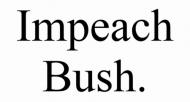The Jets, War and Lessons Still Unlearned
 By Bob Herbert from The New York Times
By Bob Herbert from The New York TimesThe more things change ...
Emerson said: "There are people who have an appetite for grief. Pleasure is not strong enough and they crave pain."
I know who those people are. They are fans of the New York Jets, and I'm one of them.
On Sept. 21, 1970, the Jets played in the first "Monday Night Football" game on ABC and lost to the Cleveland Browns, 31-21. This week they played in the last "Monday Night Football" game on ABC and lost to the New England Patriots by exactly the same score, 31-21.
In between, the Jets have lost many more games than they've won.
The world has changed in remarkable ways during those three and a half decades. But in some very important ways, like my Jets, it hasn't changed much at all.
Richard Nixon was president when that Monday night game was played, and the nation was in a schizoid frenzy over Vietnam. Words like "fast-food," "hype" and "rip-off" were gaining footholds in the national conversation. Blackberries were still something you ate. Newspaper articles were typed on cranky Underwoods and edited with the help of straight edges and glue pots.
Walter Winchell, Harry Truman and Pablo Picasso were still alive.
What struck me when I hit the digital files for information about 1970 was how easy it was to get the data, but how little we seem to have learned since then. Americans were split like the Hatfields and the McCoys over the war. But its opponents did not yet have the muscle to bring it to an end. Many thousands more would have to die, each death more pointless than the last.
In May 1970, during a series of encounters at Kent State University in Ohio, members of the National Guard bayoneted and ultimately opened fire on students (not all of whom were antiwar protesters). Four students were shot to death.
Days later, in Lower Manhattan, flag-waving, helmeted construction workers broke up a student antiwar demonstration and beat up several protesters. As The Times reported:
"The workers then stormed City Hall, cowing policemen and forcing officials to raise the American flag to full staff from half staff, where it had been placed in mourning for the four students killed at Kent State University on Monday."
The hawks claimed the flag and branded the opponents of the war as cowardly and unpatriotic. Nixon invited the leaders of New York's construction unions to the White House and thanked them for their support.
Kathy Huppe was treated somewhat differently. She was Miss Montana in the Miss America beauty pageant that year. While carrying a bouquet of roses in her right hand, she raised her left and made a fist to show her opposition to the war. Pageant officials, as Life magazine noted, were not amused. They barred her from the finals.
On the same day that The Times was reporting on the Jets' Monday night defeat in Cleveland, it ran a freelance column by Walt Rostow, one of the ultimate hawks from the Johnson administration, who warned that the sky would fall if the U.S. were to "cut and run" in Vietnam.
Said Rostow:
"Contrary to every short-run political and personal interest, three successive American presidents decided over the past decade that the events set in motion by a prompt withdrawal of our forces and commitment from Vietnam and the Asian mainland would risk a larger war there and create dangerous instability elsewhere."
In other words, we have to keep feeding the flames of war with the healthy bodies of our kids because if we were to stop something bad might happen.
Sound familiar?
The main lesson that should have been learned from the 60's, the 70's and every other decade is the lunacy of sending young people to die in unnecessary wars. It's a lesson the species seems incapable of learning.
Another important lesson was offered by James Reston of The Times, who wrote in his column of Sept. 9, 1970, about the alarming number of U.S. citizens "who seem to feel that voting is not the answer to their grievances."
If you'd like to read the rest of this article buy TimesSelect





0 Comments:
Post a Comment
<< Home